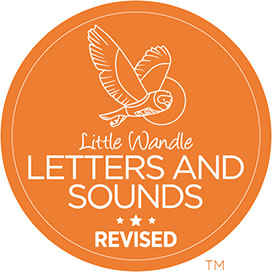Our Phonics Curriculum
At Haslingfield Endowed Primary School we believe that in order for our children to become fluent readers and writers, phonics should be taught through a systematic and structured phonics programme.
How we teach early reading
We use the Little Wandle Letters and Sounds Revised to plan and provide daily our phonics lessons.
In phonics, we teach children that the letters of the alphabet represent a different sound, that these can be used in a variety of combinations and are put together to make words. The children learn to recognise all of the different sounds and combinations that they might see when they are reading or writing.
Our phonics starts in Reception and follows a very specific sequence that allows our children to build on their previous knowledge and master specific phonic strategies as they move through EYFS and KS1. As a result, our children are able to tackle any unfamiliar words that they might discover with confidence. We also ensure that we model these strategies in shared reading and writing both inside and outside of the phonics lesson and across the curriculum. We have a strong focus on the development of language skills for our children because we know that speaking and listening are crucial skills for reading and writing in all subjects.
How we teach phonics
- In Reception and Y1, children follow the progression within Little Wandle Letters and Sounds Revised programme. Phonics is taught daily and there is a review session on a Friday.
- Phonics starts in Reception between week 3 and 4, once the children have settled, to ensure the children make a strong start with their phonics journey.
- By the end of reception, children will have been taught up to the end of phase 4.
- By the end of year 1, children will have been taught up to the end of phase 5.
- Reception lessons start at 10 minutes, with daily additional oral blending – increasing to 20/30 minutes as soon as possible.
- Y1 lessons are 20/30 minutes long.
- In Y2-Y3, phonic lessons are taught daily to children where appropriate – following the model of Little Wandle but plugging specific gaps identified through assessment.
- In Y3-Y6 there are planned phonic ‘catch-up’ sessions following a set model to address specific reading/writing gaps where needed. These are short, sharp sessions lasting 10 minutes in length and taking place at least three times a week.
Reading practise sessions
- Children across Reception, year 1, year 2 (and beyond if appropriate) apply their phonics knowledge by using a decodable reader closely matched to the children’s phonics needs in a small group reading practise session.
- These sessions are 15 minutes long and happen three times a week. The children work in groups ranging from groups of 6-10.
- The sessions follow the model set out in Little Wandle Letters and Sounds Revised. The first reading session focuses on decoding, the second on prosody and the third on comprehension.
- The children will take a fully decodable book home for the week, changing these on a Thursday or Friday. In addition to this, the children take a library book home to share with their family, these can be changed as regularly as the children would like.
- In reception these sessions start in week 4. Children who are not decoding, do a little blending lesson, following the model set out in Little Wandle Letters and Sound Revised and share picture books to develop confidence.
How do we assess phonic knowledge?
- In reception and year 1, at the end of each week there is a review session which recaps the learning. There are also whole review weeks (pre-planned and bespoke review weeks to address gaps identified by the class teacher’s ongoing formative assessment).
- Children identified in reception and Y1 that need support are immediately identified and daily ‘keep up’ sessions are put in place – sessions follow the Little Wandle Letters and Sounds Revised programme.
- In reception and year 1, the children are assessed at the end of every half term using the Little Wandle Letters and Sounds Revised assessment tracker.
- The children in Y1 sit the Phonics Screening Check in the summer term.
- Children in Y1 who do not reach the expected standard in the Phonics Screening Check in Y1, will re-sit in Y2 following support sessions to tackle misconceptions and gaps in learning.
- Children who are in Y2-Y6 and need ‘catch up’ sessions are assessed through teacher’s ongoing formative assessment as well as half termly summative assessments.
If you are a parent and would like more information about how to support your child with phonics at home, please follow this link to find the Reception and Year 1 overview as well as videos of the sound pronunciations, letter formation sheets and other helpful resources.
https://www.littlewandlelettersandsounds.org.uk/resources/for-parents/
